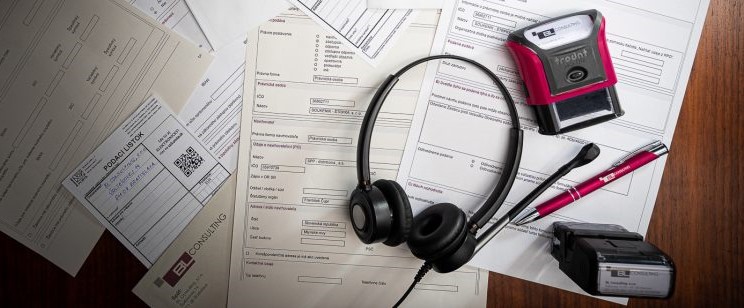CreditCall and receivables management: how to prevent unpaid invoices effectively?
Back to the listOne of the four divisions in CreditCall is collections or receivables management. A useful option for legal entities in case the other party fails to pay them an invoice, bill or instalment. The whole process starts with the so-called early collection. On behalf of our business partners, we contact our clients’ customers or clients’ customers just before the due dates within the framework of early collection in order to remind them of their obligations or to help them resolve the situation to their mutual satisfaction.
However, Juraj Balogh, CreditCall’s Executive Director, will tell us what it means, what receivables management entails and how the process works.
Receivables management, one of the important activities of our company, is carried out for many clients. How do we distinguish between types of receivables?
We divide them into two sectors.
- B2B (business to business) – receivables management for legal entities – i.e. companies, firms, institutions
- On behalf of our business partners, we contact their corporate clients in the event of unpaid invoices for services or goods. This ranges from large companies with a number of outstanding invoices to small companies, such as construction companies, that have carried out work for other companies such as refurbishment of premises. This is a mandated debt recovery. Once the debts from our clients’ debtors are handed over to us, we immediately begin the out-of-court recovery process, which is conducted in writing, by telephone or in person. In order to settle the debt, we conclude an acknowledgement of liability or a repayment plan with the debtor. If we are unable to recover the claim out of court, we will recommend a course of action to our partners based on the information obtained.
- B2C (business to customer) – debt recovery from the final consumer, i.e. debtors e.g. health insurance companies, insurance companies, banks – in case of non-payment of loans, etc.
- For example, we cooperate with the health insurance companies Dôvera and Union, and we also process claims for the insurance company Allianz. We address debtors of our business partners, where we deal with arrears e.g. for insurance, health insurance contributions . Ale máme aj klientov, pre ktorých zabezpečujeme celý servis, od vystavenia faktúr alebo platobných avíz, ktoré posielame elektronicky, vrátane platobného linku s možnosťou platby cez platobnú bránu. Zároveň dokážeme takýmto klientom automaticky párovať platby, prípadne im pomôcť s reklamáciami platieb alebo služieb či tovaru. Takže poskytujeme dnes už komplexný servis.
What is the details of receivables management for a specific company in the B2B sector?
Let’s take a concrete example. Heineken, by the way, is a large multinational company with which we have been working for many years in the form of mandate management.
Our business partner will send us a list of their debtors. We will process the list and import it into our collection system and confirm to the client the start of the collection process.
Debtors are sent first reminders by post and email, then contacted by telephone. The further procedure is very individual, it depends on what attitude the debtor takes to his/her debt, whether he/she is interested in financial settlement (usually in the form of instalments) or we are looking for a joint solution.
However, there are also debtors who refuse to pay and refuse to communicate. In the situation that mutual agreement with the debtor does not lead to successful payment of the debt, we inform the client that the out-of-court procedure was unfortunately unsuccessful.
In such a case, the client usually decides to proceed through the courts. Through our lawyer we will prepare the court action. But our work does not stop there, CreditCall is still the intermediate link between the client, the lawyer, the court and the debtor. Such cases often end up in enforcement proceedings, all financial movements are recorded in our system.
How is B2C debt recovery different?
Early debt collection is an effective way to avoid the emerging risk of unpaid debts also for individuals. Based on databases from our clients, we have divided the process and system into two main steps:
- Contact before due date: Shortly before the due date of the invoice (2-3 days), our collection specialist contacts the debtor in order to verify that the service or goods have been delivered correctly, that the correct invoice has been received and that we can therefore expect payment by the due date. This step creates space to address any potential issues that could prevent payment, allowing for a timely response and therefore we can work together to prevent additional complications.
- Contact after due date: If the debt has not been paid by the debtor, we contact the debtor 7 to 14 days after the due date to find out the reason for the delay in payment. Here it is important to have an open and constructive discussion that will lead to clarification of the situation and finding a solution.

Is it possible to compare whether it is more complicated or, on the contrary, more successful to enforce for the B2B or B2C sector?
There is no easy answer to this. It may seem that it is more difficult to manage receivables for the B2B sector. Although we get a list of debtors and contacts from the client, it often happens that the specific people specified no longer work for the company or the company has moved, so we are also detectives and look for new contacts. It happens not infrequently that debtor companies have several debts, they owe not only for goods, but also for VAT or social or health insurances for levies, and in such a case the state’s debts take precedence over “our” ones.
Conversely, again, it could be said that calls for the business sector are quieter than they may be for individuals. Our operators come into contact with people in more difficult life situations who do not welcome our phone calls or who are downright annoyed by them. However, in both cases, situations need to be handled calmly, with a cool but sensitive head, patiently explaining the problem and helping the client find a solution.
What are the benefits of professional debt management for our clients?
Outsourcing debt recovery offers a number of advantages that can make a significant contribution to optimising financial processes in any company. I would like to summarize and add the main advantages:
- No upfront fees, commission based on success only: the client only pays for the results of our work, which means he has no financial risk in case of failure. This payment model incentivizes service providers to maximize their recovery efforts.
- Third-party psychological effect: the presence of an independent call centre can signal to the debtor the seriousness of the situation, which often leads to a faster and more willing fulfilment of obligations. Borrowers often tend to avoid payments if they feel they can commit to them without repercussions.
- Global reach: in international business relations, it is essential to have a partner who can collect debts across borders. This broadens the possibilities and increases the chances of success.
- Avoiding employee overload: debt collection can be a source of stress and requires time that our clients can devote to other strategic areas of the business.
- Obtaining additional information about the debtor: During the collection process, we can obtain valuable information about debtors that can assist clients in future business decisions as well as potential legal or enforcement actions.
- Regular reporting and transparency: with online access to the receivables status and regular monthly reports, we provide a constant overview of your finances. In this way, our clients have a complete overview of the success of their collections and adapt their financial plan to the current situation.
Outsourcing debt collection is an effective strategy that can not only increase the success rate of collecting payments, but also improve the overall financial performance of any company in the long run.
Do we also recover foreign debts?
Recovering debts from abroad is a complex process that requires a thorough understanding of local legislation, language barriers and business practices. Our international network of partner law firms enables us to effectively manage these challenges as well.
It is essential to obtain all available information about the debtor before commencing debt recovery. This includes all contact details such as telephone numbers, email addresses and postal addresses. Our priority is to make contact with the debtor as soon as possible. The quicker the process is started, the higher the likelihood of payment.
Of course, this could not be done without quality operators with knowledge of foreign languages. We can cover communication in English, German, Hungarian, Czech, Romanian and Ukrainian. However, we also have linguistically proficient operatives in our other divisions, not just collections and recovery.
